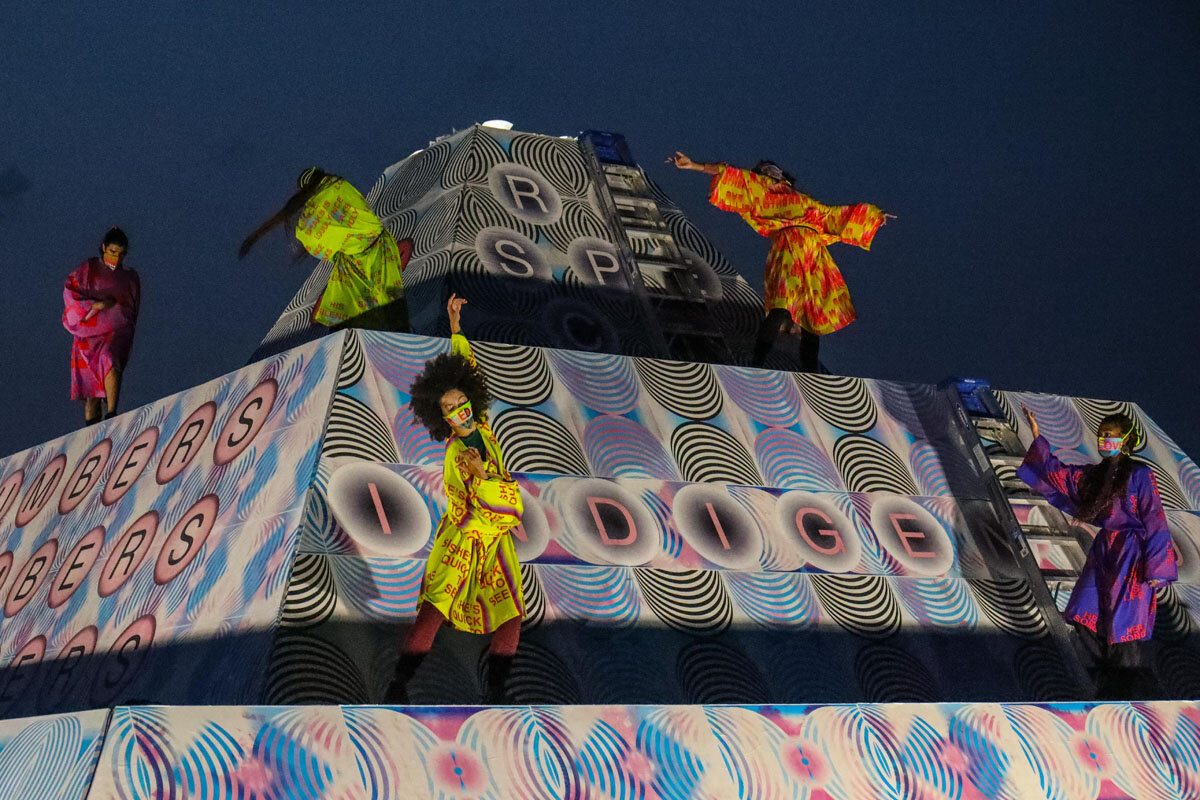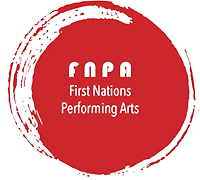
the visibility of Indigenous performing arts workers
while Decolonizing the performing arts field
in what is currently called the US.
Emily Johnson/Catalyst, The Ways We Love and The Ways We Love Better – Monumental Movement Toward Being Future Being(s).
Performance view, featuring Angel Acuña, Denaysha Macklin, Kim Savarino, Stacy Lynn Smith, Ashley Pierre-Louis and
Jeffrey Gibson’s sculpture Because Once You Enter My House It Becomes Our House, Socrates Sculpture Park, 2020.
Photo credit: Photo by Scott Lynch
We at FNPA are uniquely committed to visioning and action, with and for Indigenous performing artists, in service to the following:
a) aligning and making visible the entire Indigenous field of performance practice in what is currently called the US including Indigenous artists, Indigenous arts workers, organizations, and collectives;
b) prioritizing the work of institutional decolonization in the contemporary performance field;
c) readying the US-based Indigenous performing arts sector to be a true global partner with our allies and kin in what is currently called Canada and Australia, as well as Aotearoa (NZ), and elsewhere–areas where robust infrastructures for development, convening, research, commissioning and international touring in support of Indigenous artists already exist, as well as government and public acknowledgement of settler violence;
d) readying the so-called US-based, Indigenous performing arts sector to be a true global partner in areas of the world where, as is such currently in the US – there is no current infrastructure for development, convening, research, commissioning, and international touring in support of Indigenous artists, nor a government or public acknowledgement of settler violence and reparations work; and,
e) uniquely focusing on building local and international touring, commissioning, and residency support for Indigenous artists in a way not currently addressed by our partners and collaborators indicated above.
FNPA works in partnership with Decolonial Action Coalition’s strategies for change – which include the development of institutional Decolonial assessment and public review processes. Moreover, we seek to do this work collectively across the national landscape, through networks and modeling community-centered and Decolonial ways of organizing, advocating, learning, and fostering change.
Our understanding of Decolonization aligns with that of the Decolonial Action Coalition.
Their words are excerpted below from Notes for Equitable Funding From Arts Workers
“While Indigenous peoples recognize the ways in which struggles for equity and inclusion are interrelated with those for decolonization, they are not commensurate. Typically ‘equity’ and inclusion are the means by which the state and/or institution is held accountable and made more fair or just. In other words, the presumption is that the state/institution will continue and while not optimal, is reformable or perfectible. We are reckoning with settler colonialism, a process, and structure by which the colonists, with no recognizable intention of leaving, stayed. Decolonization suggests a withdrawal or refusal of the colonialist entity, and is the means by which peoples work to (re)establish their independence and sovereignty. It is a project and a process that includes deconstructing and dismantling (colonialist) systems and structures at the same time that it works to revitalize Indigenous ways of being and knowing...
The dispossession and displacement of Indigenous peoples and the devastating effect that forced relocation has had on these communities has been largely hidden within nationalist narratives. While many Indigenous nations have treaties with the United States government that acknowledge Indigenous sovereignty on Indigenous lands, most are only allowed occupancy. As a result of genocide, colonization, and relocation, often the land on which Indigenous nations and communities reside is not currently the land to which they have ancestral ties...
While settler colonial states continue to struggle to recognize inherent Indigenous sovereignty, institutions struggle to reconcile their complicity in the settler-colonial project of erasure with their place and their obligation to commit to remediating legacies of violence and erasure...
As a path toward remediating the theft of land and relations disrupted by all those forces that enact violence against land and intergenerational relations, collectivity, and communality, there is an urgent need to recognize what is at stake.
Institutions can make deliberate and intentional steps toward greater accountability and action, by displacing their authority and moving to center and privilege Indigenous decision making and leadership.
Indigenous leadership must be resourced to develop structural initiatives that move the project of decolonization forward. These initiatives will fundamentally challenge, transform and, in some instances, replace existing cultural institutions and practices. With sharp attention to ongoing and embedded systemic and structural Indigenous erasure, racism and colonial and anti-Black representation within institutions, we must transform and change institutional systems and governance.”
